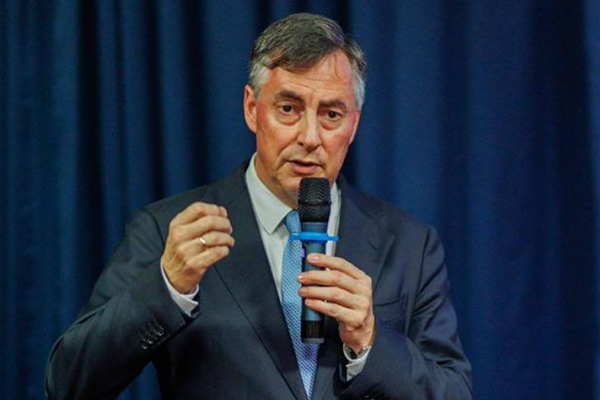The Chinese Embassy in Ghana has rejected comments by Mr. David McAllister, Chair of the Committee on Foreign Affairs of the European Parliament that China’s zero-tariff agreements may appear generous but could deepen trade imbalances.
The Embassy described the remarks as “false” and misleading, and that such assertions undermined the efforts by China and Ghana to strengthen economic cooperation and expand opportunities for Ghanaian exports in the Chinese market.
Mr. McAllister, during an interaction with students of the Ghana Institute of Management and Public Administration (GIMPA), had urged Ghana to carefully assess its trade relations with China.
The Embassy, in a statement issued in Accra on Friday, said the claims were based on a lack of understanding of China’s economic cooperation with Ghana and the broader African continent.
Mr McAllister asserted that unlike the European Union’s (EU) Economic Partnership Agreement (EPA) with Ghana, which he described as “balanced and sustainable”, China’s trade model was driven by “different motives and values.”
Reacting to the claims, the Chinese Embassy dismissed those assertions and insisted that China’s zero-tariff treatment to Ghana was a voluntary and unilateral initiative aimed at deepening economic cooperation and supporting Ghana’s export growth.
“Mr. McAllister’s statements are as absurd as they are ridiculous,” the Embassy’s spokesperson said.
The Embassy said, “Apparently, he hasn’t done his homework to learn that the zero-tariff treatment is China’s initiative to voluntarily and unilaterally open its market wider. Nor has he straightened out his mind to the fact that the treatment will boost Ghana’s export expansion and trade balance.”
It noted that China’s decision to offer zero-tariff treatment reflected Beijing’s longstanding commitment to fair trade and mutual development with Ghana and Africa as a whole.
The Embassy added that the growing presence of Chinese goods in Ghana’s markets was driven by consumer preference, affordability, and quality, not coercion or manipulation.
“The popularity of Chinese products in Ghana is simply because you can get a prime with just a dime, which is the free and independent choice of Ghanaian importers. Just ask the buzzing crowd of locals at China Malls,” the statement said.
Rejecting Mr. McAllister’s suggestion that Ghana risked overdependence on China, the Embassy said China had proven to be one of Ghana’s most consistent and reliable partners in industrialization, infrastructure development, and agricultural modernization.
It cited data from the Ghana Investment Promotion Centre (GIPC) indicating that China had become Ghana’s largest investment partner, with 22 registered projects in the first half of 2025 alone.
The statement indicated that China had been a consistent partner in Ghana’s industrial and agricultural transformation, contributing to major infrastructure projects such as roads, bridges, factories, and hospitals.
It added that China had become Ghana’s leading source of investment, driving growth across several key sectors.
“Which other partner dares to claim comparable contributions?,” the Embassy questioned.
The Embassy also emphasized that the zero-tariff arrangement was a mutually beneficial initiative endorsed at the highest political level between the two countries.
It recalled that President John Dramani Mahama, during his recent visit to Beijing and meeting with President Xi Jinping, had publicly announced Ghana’s intention to finalize the early-harvest phase of the zero-tariff agreement.
“It was President Mahama himself who announced that Ghana would finalize the early-harvest agreement of the zero-tariff treatment during his visit to China and meeting with President Xi Jinping just two weeks ago,” the spokesperson said.
The statement also took issue with what it described as Europe’s tendency to lecture rather than listen, urging Western leaders to focus more on supporting African-led growth rather than criticizing the engagement of other partners.
“Mr. McAllister may wish to listen more and lecture less, promoting more European trade policies in favor of African development. Baseless defamation against other nations does not elevate one’s own stature,” the spokesperson said.
Mr. McAllister had acknowledged Ghana’s sovereign right to choose its partners but urged African nations to scrutinize the long-term benefits of trade offers from global powers, including China.
However, the Chinese Embassy reiterated that its cooperation model was founded on equality and respect for sovereignty, principles it said had underpinned the decades-long China-Ghana friendship since the establishment of diplomatic relations in 1960.
Beijing’s zero-tariff initiative, announced earlier this year, aims to extend duty-free access to 98 percent of taxable items imported from Ghana and other least-developed countries with diplomatic relations with China.
Ghana is among the first African nations expected to benefit from the policy, which Chinese officials say will help boost exports of cocoa, cashew nuts, textiles, and manufactured goods to the Chinese market.
The Embassy reaffirmed China’s commitment to deepening its partnership with Ghana in trade, investment, technology, and cultural exchange.
GNA





